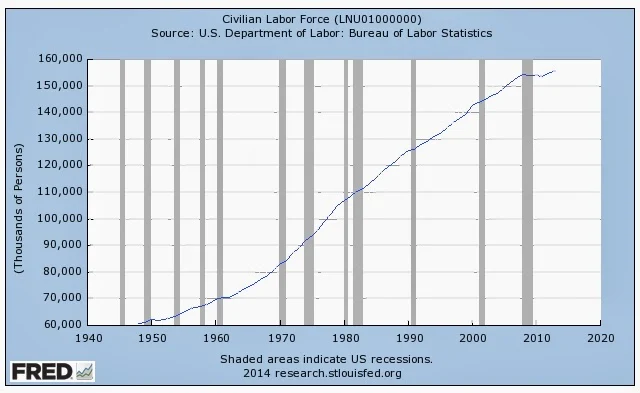 |
| 1) Civilian labor force level 2007-2013 |
After falling during the financial panic and its aftermath, the civilian labor force level has been trying to climb out of a deep hole, a hole which got close to, at the very end of 2010, but did not reach as deep as, the pre-recession level in the winter of 2006-2007.
In point of fact, the civilian labor force level has reached a new all-time high in the now much missed and lately departed summer of 2013, above the 157 million mark. That said, the prior trend looked at as an annual average indicates that the level should be much more like 165 million by now (graph 2). We are way behind in the growth of the labor force, which is as much an abortion problem as it is a demographic problem which includes not just retirements but smaller families of the baby boomers going on to have no families. At any rate, growth of the civilian labor force hit a major speed bump in the financial panic and aftermath, from which it is only slowly just lately showing signs of recovery.
As graph 1) shows, steady progress has been made since 2010 with steadily higher highs and ever shallower lows in the civilian labor force level, until recently. The steepness of the drop since the summer of 2013 is nearly as severe as the drop in 2009.
Normally the measure of the level of the labor force peaks in the summers, as does the number saying they work usually full-time. Then both measures retreat in the winters. I'm assuming this has to do with students who work full-time jobs in the summers going back to school in the winters, when, characteristically enough, the measure of those working usually part-time rockets up. The students leave their full-time summer jobs and get part-time ones during the academic year, or take on part-time work schedules at their old jobs while they hit the books. Seasonal holiday work by non-students also boosts the usually part-time measure. But after reaching a peak of 28.106 million in March 2010, usually part-time peaks have been flat to declining: 28.068 million in November 2010 (the level never got to 28 million in 2011), 28.096 million in February 2012, and 28.050 million in April 2013.
As the level of the civilian labor force has recovered to higher highs each summer, the level of the winter lows has fallen to ever shallower levels, but the recently logged level for December at 154.408 million narrowly undercuts the March 2013 low of 154.512 million, with three months to go. Maybe this year we are witnessing students, who are normally classified as not in the labor force, having trouble finding part-time work. Hence they have dropped out, again so to speak.
That's not good news.
 |
| 2) Average annual civilian labor force level since 1950 hit a speed bump in 2008 |